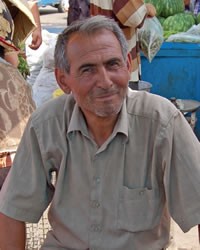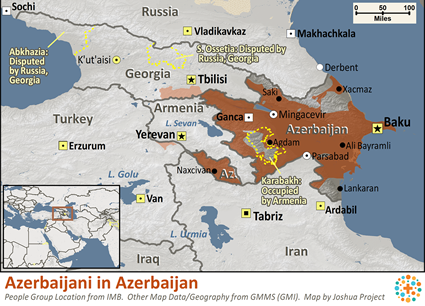Azerbaijan is in the Caucasus Mountain region on the western shore of the Caspian Sea. It is there, in the land of the ancient Medes, that we find more than six million Azerbaijanis (also known as the Azeri). The name "Azeri" is thought to have come from the fourth century ruler, Atropat, who governed the area that is now northwestern Iran. However, it may have been derived from azer, the Persian word for fire. Their language belongs to the southwestern (Oguz) branch of the Turkic language family. Azeri has a written tradition that dates to the fourteenth century.
The Azeri have been subjected to numerous invasions throughout history. The Azeri homeland was first conquered by the Persians in the sixth century B.C. Islam was introduced into the area during the seventh century A.D. and has been practiced there ever since. By the eleventh century, Persian influence was overpowered by Turkic influence. During the thirteenth century, this region of Asia fell under the dominion of Genghis Khan. Russian involvement in the Trans Caucasus began in the early eighteenth century to obtain raw materials. In 1922, Azerbaijan was incorporated into the Soviet Union. This changed the face of the nation, mainly through the development of petroleum resources.
The climate ranges from warm to sub-tropical temperatures. Grain, grapes, cattle, sheep and goats are raised in abundance. Vegetables, fruits, and some teas are also important agricultural products. Although the land is ideal for farming, about one fourth of the population now lives in Baku, the nation's capital, working in industry. Petroleum is an important industry for the Azeris.
Azerbaijani settlements are divided into villages made up of extended families. To protect their culture, they encouraged marriage within the extended family. Unions between first cousins were considered the most desirable. Marriage to a non-Azerbaijani was almost unheard of prior to the Soviet period. Polygyny (having more than one wife) was only allowed in cases of infertility.
The Azerbaijani diet consists mainly of rice pilaf and a variety of grilled and boiled meats including beef, goat and lamb. Traditional dishes include bozartma (mutton stew), dovga (a soup made from yogurt), meat and herbs. Other dishes are dolma, khingal, kabab and dushbara. Tea and wine are popular drinks.
The Azerbaijanis are primarily Shia Muslims, but there are also some Sunnis among them. Islam among the Azerbaijani reflects the historical ties that exist between Azerbaijan and Iran. Until the twentieth century, most Azeri identified themselves as Muslims rather than Azerbaijani or Turks. They believe that being a "spiritual community of Islam" was much more important than being a nation.
In Azerbaijan, religious practices are less restrictive of women's activities than in most other Muslim countries. Most women have jobs outside the home, and a few have attained leadership positions. However, some evidence of the traditional, restrictive female role remains.
Azerbaijan experienced severe economic problems during the first years of the collapse of Soviet Trans Caucasus republics. But today it is the most powerful and developed country in the South Caucasus. The rate of unemployment has significantly decreased during the past several years.
Ask the Lord to raise up strong local churches among the Azerbaijanis that will plant more churches.
Pray for them to have spiritual discernment and an understanding of their need for a sin-free savior.
Pray for the Lord's name to be raised high in Azeri families.
Pray for Azeri disciples who will make more disciples.
Scripture Prayers for the Azerbaijani in Azerbaijan.
| Profile Source: Joshua Project |


























